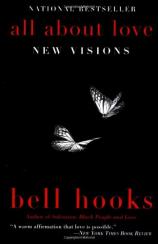Excerpt
Excerpt
All About Love

Chapter One
The men in my life have always been the folks who are wary of using the word "love" lightly. They are wary because they believe women make too much of love. And they know that what we think love means is not always what they believe it means. Our confusion about what we mean when we use the word "love" is the source of our difficulty in loving. If our society had a commonly held understanding of the meaning of love, the act of loving would not be so mystifying. Dictionary definitions of love tend to emphasize romantic love, defining love first and foremost as "profoundly tender, passionate affection for another person, especially when based on sexual attraction." Of course, other definitions let the reader know one may have such feelings within a context that is not sexual. However, deep affection does not really adequately describe love's meaning.
The vast majority of books on the subject of love work hard to avoid giving clear definitions. In the introduction to Diane Ackerman's A Natural History of Love she declares "Love is the great intangible." A few sentences down from this she suggests: "Everyone admits that love is wonderful and necessary, yet no one can agree on what it is." Coyly, she adds, "We use the word love in such a sloppy way that it can mean almost nothing or absolutely everything." No definition ever appears in her book that would help anyone trying to learn the art of loving. Yet she is not alone in writing of love in ways that cloud our understanding. When the very meaning of the word is cloaked in mystery, it should not come as a surprise that most people find it hard to define what they mean when they use the word "love."
Imagine how much easier it would be for us to learn how to love if we began with a shared definition. The word "love" is most often defined as a noun, yet all the more astute theorists of love acknowledge that we would all love better if we used it as a verb. I spent years searching for a meaningful definition of the word "love," and was deeply relieved when I found one in psychiatrist M. Scott Peck's classic self-help book The Road Less Traveled, first published in 1978. Echoing the work of Erich Fromm, he defines love as "the will to extend one's self for the purpose of nurturing one's own or another's spiritual growth." Explaining further, he continues, "Love is as love does. Love is an act of will-namely, both an intention and an action. Will also implies choice. We do not have to love. We choose to love." Since the choice must be made to nurture growth, this definition counters the more widely accepted assumption that we love instinctually.
Everyone who has witnessed the growth process of a newborn child from the moment of birth on sees clearly that before language is known, before the identity of caretakers is recognized, babies respond to affectionate care. Usually they respond with sounds or looks of pleasure. As they grow older they respond to affectionate care by giving affection, cooing at the sight of a welcomed caretaker. Affection is only one ingredient of love. To truly love we must learn to mix various ingredients-care, affection, recognition, respect, commitment, and trust, as well as honest and open communication. Learning faulty definitions of love when we are quite young makes it difficult to be loving as we grow older. We start out committed to the right path but go in the wrong direction. Most of us learn early on to think of love as a feeling. When we feel deeply drawn to someone, we cathect with them, that is, we invest feelings or emotion in them. That process of investment wherein a loved one becomes important to us is called "cathexis." In his book Peck rightly emphasizes that most of us "confuse cathecting with loving." We all know how often individuals feeling connected to someone through the process of cathecting insist that they love the other person even if they are hurting or neglecting them. Since their feeling is that of cathexis, they insist that what they feel is love.
All About Love
- paperback: 272 pages
- Publisher: William Morrow Paperbacks
- ISBN-10: 0060959479
- ISBN-13: 9780060959470

